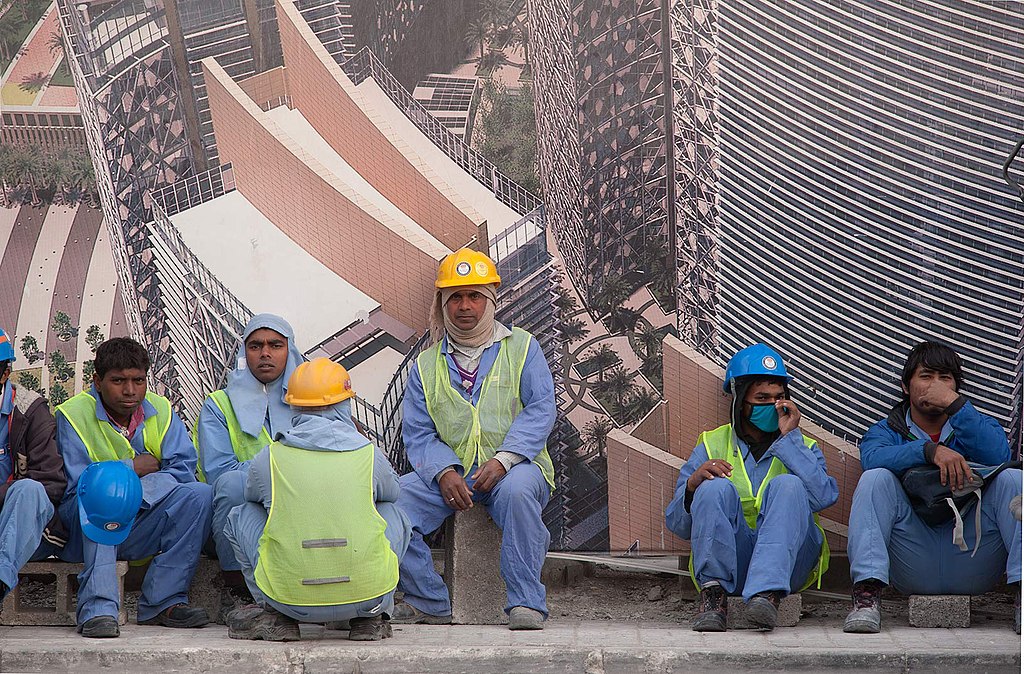
We're excited to announce the first webinar of the Borderings seminar series: Are single male labour migrants being neglected? Join us on Tuesday 29th September at 12pm for a fascinating look at the intersections of migration, gender and health in the gulf.
The Covid-19 pandemic has brought into sharp relief the deep social fractures and inequalities that shape the health of international labour migrants. Despite being young and relatively healthy, poor and crowded living and working conditions put labour migrants at higher risk of not only COVID-19, but a host of other health issues.The short-term temporary status of labour migrant workers further complicates access to health care services.
In some Gulf countries, labour migrants constitute the majority of the population. This sub-population is often male-dominated, with men constituting up to every four-in-five migrant workers. The skewed sex ratio reflects the gendered determinants of both migration and the division of labour, but is gender considered in responses to migrant health? This webinar puts the health of male labour migrants at the center and explores the intersections of gender, health and migration in the Gulf states.
The Panel
Insights and challenges on obtaining data and conducting research on the health and wellbeing of male labour migrants from low-middle income country settings.
Kolitha Wickramage, Global Migration Health Research and Epidemiology Coordinator, IOM Migration Health Division
Kol heads IOM’s Global Health Research and Epidemiology unit responsible for providing technical guidance on advancing research and evidence generation across IOM’s three health programmatic areas: health assessments of migrants and refugees (medical examinations and pre-migration health interventions); health assistance for crisis-affected populations; and, and technical cooperation on migration health with Governments, UN, academic partners.
Vulnerabilities of male labour migrants in the Gulf.
Zahra Babar, Associate Director for Research, Center for International and Regional Studies, Georgetown University in Qatar.
Zahra is Associate Director for Research at CIRS at Georgetown University in Qatar. She previously worked for the United Nations Development Program and the International Labour Organization. She has published several articles and book chapters, most recently, “Labor Migration in the Persian Gulf”, in The Routledge Handbook of Persian Gulf Politics, Ed., Mehran Kamrava (Routledge, 2020); “Migrant labor and human rights in the Gulf Cooperation Council (GCC) countries”, in Why Human Rights Still Matter in Contemporary Global Affairs, Ed., Mahmood Monshipouri, (Routledge, 2020); “Understanding Labour Migration Policies in the Gulf Cooperation Council Countries" in Asianization of Migrant Workers in the Gulf Countries, eds. S. Irudaya Rajan and Ginu Zacharia Oommen, (Springer, 2020); and "Gender and Mobility: Qatar’s Highly Skilled Female Migrants in Context," with M. Ewers and N. Khattab, Migration and Development, (2020)
Are policies attentive to labour migrants’ health? Examining sending and receiving policies on sexually transmitted infections.
Wafa Aftab, Department of Community Health Sciences, Aga Khan University.
Wafa is a faculty member in the Department of Community Health Sciences, Aga Khan University, Pakistan where her teaching and research focuses on health policy and governance of health systems and intersectoral actions for health. In migrant health she is currently studying the policy environment in Pakistan and Qatar related to structural factors which influence the health of migrant labour workers from Pakistan working in Qatar. She is also a medical doctor with training in internal medicine.
About 'Borderings: Migration, Gender and Health'
Continuously created and recreated, policed and enforced, borders demarcate boundaries of belonging. But borders are not only lines on the map, they are also drawn between people in the form of identity constructs; migrant-citizen, male-female-non-binary, healthy-ill. These borderings are never neutral nor contained but are rather diffracted through each other and laden with associations and meanings. Our Borderings series poses a set of questions that encourage us to think more critically about the borderings of gender, migration and health.
Gender is filtered through every stage of migration. Gender influences reasons for migrating, who migrates and to where, how people migrate and the networks they use on their journeys, the opportunities and resources available at destinations, and relations with the country of origin. Health risks, vulnerabilities and needs are also shaped in large part by one’s gender, and often vary drastically between different groups. And yet, the gendered dynamics of migration and health remain starkly understudied and examined.
In a collaboration between the UCL Centre for Gender and Global Health, the UCL Migration Research Unit and Lancet Migration, Borderings: Migration, Gender and Health series seeks to promote, enhance and connect dialogues of migration, gender and health.
Lancet Migration: global collaboration to advance migration health’ is a new collaboration between The Lancet and researchers, implementers, and others in the field of migration and health that aims to address evidence gaps and drive policy change, building on the recommendations of the UCL-Lancet Commission on Migration and Health published in December 2018 (www.migrationandhealth.org)
September 29, 2020 12:00 PM